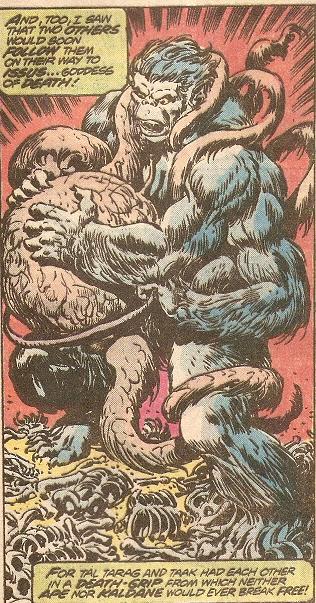
In the past two-three years steampunk has mutated from a science fiction sub-subgenre derived of cyberpunk into something of a lifestyle, taken up by goths looking for something new to be mopey in and hipsters looking for the next ironic thing. It’s been going on for longer of course, but it broke the ‘net’s awareness threshold only recently. In the process steampunk has been stripped of all meaning, as the above Kate Beacon strip refers to, reduced to a series of tropes and fashion accessories. Nothing wrong with playing a bit of dressup, but it has become so ubiqitous now it’s starting to piss people off, as the following heartfelt rant by Philip Reeve shows, already deleted from his website but still in Google’s cache:
No, the problem that I have with Steampunk as a genre is that it’s basically dead. Returning again and again to the same tiny pool of imagery, the writers of Steampunk are doomed to endless repetition. What I used to love about Science Fiction as a teenager was the way that, when you picked up one of those yellow Gollancz SF titles at the library, you had no idea where it would take you; it might be to some dazzling technological future or post-apocalyptic wasteland; it might be to another planet; or it might all be set in the present, just around the corner. But when you pick up a Steampunk book you know pretty much exactly where you’re going; it will take place in an ‘alternate’ nineteenth century which will be neither as complex nor as interesting as the actual nineteenth century. There will be airships; rich villains will be hatching plots involving clockwork and oppressing the workers; rich heroes will see the error of their ways. Most of the characters will not display any of the attitudes or beliefs of the past, but will act and speak like modern people in Victorian fancy dress.
[…]
Steampunk is a genre cul-de-sac: it’s Science Fiction for people who know nothing about science; historical romance for readers whose knowledge of history comes from costume dramas.
I can understand where Reeve is coming from, though he’s stacking the deck somewhat by comparing science fiction with steampunk. If you look at any of science fiction’s subgenres, be it steam or cyberpunk, or planetary romance or space opera or whatever it will seem more limited and codified than the field as a whole, but that’s comparing an entire forest with one of its trees… If you look at the mainstream works within any given (sub)genre, science fictional or otherwise, these works will tend to resemble each other, with the interesting/innovative stuff happening at the borders where genres meet. But there’s nothing wrong with being a well written genre work that does not confound expectations either. What Reeve sees as the problems of steampunk in the first quoted paragraph, are not faults of the genre, but rather of lazy writers taking the set of assembled cliches and not doing much with them. A better writer could take all these cliches and get more out of them.
Reeve is more on the mark in the second paragraph I quoted. He’s echoed by Steampunk Scholar, who is obviously more tolerant of the subculture [1]:
While there are steampunks who have read the original three (Jeter, Powers, and Blaylock), who watched Wild, Wild, West when it had nothing to do with Will Smith or giant steam-spiders, there are those who seem to think that steampunk is the product of the last three years of what I would call the steampunk boom years. Few steampunks read, and even fewer have read early steampunk, or proto-steampunk like Pavane or Nomad of the Time Streams, to say nothing of the handful that have actually read Verne and Wells. So I’m not too surprised when steampunks display an ignorance for the literary origins of the sub-culture.
Steampunk as a literary genre speaks to a weird sort of nostalgia for an era none of its writers or readers have lived through, unlike e.g. sixties nostalgia which is largely driven by baby boomers remembering their childhood. Instead, it’s nostalgia at a remote, based on media recreations of the era like the Disney adaptations of Jules Verne novels or the various movies of Classic Victorian novels. In science fiction it is perhaps as much driven by a nostalgia for earlier eras of science fiction itself, as much as an aesthetic preference for the look and feel of victoriana. It’s no coincidence that the first wave of steampunk novels or steampunk precursors, like the two examples Steampunk Scholar gives, Pavane and Nomad of the Time Streams were written in the late sixties and early seventies, after the New Wave had completely reimaged science fiction. There was something of a nostalgia backlash going on in science fiction then, even amongst those like Moorcock who had been the driving force behind the New Wave. Yet at the same time, how Moorcock (or Harry Harrison in A Transatlantic Tunnel, Hurray! amongst others) used steampunk was as much as to criticise the contemporary world around them as much as it was an escape to “a simpler time”. There was a political element to those early works that may well be lacking in contemporary steampunk.
It should not come as a surprise that proto-steampunk or early steampunk is more interesting, more eclectic than those works currently sold as cyberpunk: the same happened with cyberpunk before it and the New Wave before that. It’s the difference between novels written as a singular enterprise and those written within the knowledge and expectations of an already defined genre. And of course genres mutate over the course of their lives; how much does contemporary steampunk still have to do with the examples Steampunk Scholar mentions of earlier works? How much is complaining about people not knowing their history justified and how much is it just yelling at those kids to get off your lawn?
[1] Both posts found via my namesake.


